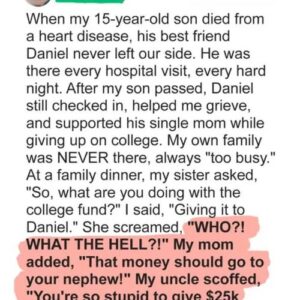The school year began with Mrs. McCarthy standing in front of her sixth-grade homeroom class. She smiled at the familiar faces from last year. “Welcome to a new year, class! I love you all equally, and I’m so glad to have you here,” she announced warmly.
Despite her outward enthusiasm, Mrs. McCarthy harbored a silent disdain for one student, Harvey. His shabby clothes and poor grades set him apart from the rest, and she couldn’t help but view him as a problem case. Harvey’s appearance and academic struggles only deepened her frustration, making him an unwelcome distraction in her otherwise orderly classroom.
Throughout the year, Mrs. McCarthy kept a watchful eye on Harvey, often shaking her head in disappointment when he struggled to grasp concepts or when his unkempt appearance clashed with the neatness she valued so highly. Her interactions with him were terse and uninspired, and she couldn’t hide her irritation whenever he fell short of her expectations.
The final days of the school year arrived, and Mrs. McCarthy, as always, found herself eagerly anticipating the end of the term. She would soon leave behind the chaos and return to her own life, leaving the students—and Harvey—behind.
On the last day of school, the students excitedly gathered their belongings and prepared to leave for summer vacation. Harvey approached Mrs. McCarthy with a small, neatly wrapped gift in his hands. His eyes were a mixture of nervousness and determination.
“Ms. McCarthy, I have something for you,” he said quietly, extending the package towards her.
Mrs. McCarthy took the gift with a hint of skepticism. She barely managed a polite smile. “Thank you, Harvey,” she said, her voice betraying little enthusiasm. She set the gift aside on her desk, eager to conclude the day’s events and head home.
That evening, as Mrs. McCarthy was tidying up her classroom, she remembered the small package. Feeling a twinge of guilt for her lack of appreciation, she decided to unwrap it before leaving. To her surprise, the wrapping revealed a simple but beautifully crafted wooden box. It was intricately carved with a design that suggested someone had put genuine effort into its creation.
Curious, Mrs. McCarthy opened the box to find a delicate silver necklace inside. The pendant was a small, polished stone, set in an elegant silver frame. It was not particularly valuable, but there was something about it that struck a chord with her.
As Mrs. McCarthy held the necklace in her hand, a note fell from the box. She unfolded it and read the handwritten message:
*Dear Ms. McCarthy,*
*I know you might not think much of me, but I wanted to give you this gift. I made the box myself in art class. The stone is from my grandmother’s garden. I thought it might bring you some happiness. I know I didn’t do well in your class, but you taught me more than you know. Thank you for helping me through this year.*
*—Harvey*
Mrs. McCarthy’s eyes filled with tears as she read the note. She realized that Harvey, whom she had so unfairly judged, had poured his heart into making something special for her. The gift was not just a token of appreciation but a symbol of his resilience and the deep respect he held for her despite the challenges he faced.
In that moment, Mrs. McCarthy’s feelings shifted dramatically. The realization of her own shortcomings—the way she had treated Harvey—hit her hard. She saw beyond the shabby clothes and poor grades, understanding the real value of the person she had overlooked.
The following day, Mrs. McCarthy sought out Harvey before he left for summer vacation. She found him waiting at the school gates with his mother. Her heart ached as she approached them, holding the necklace in her hand.
“Harvey,” she began, her voice trembling slightly, “I wanted to thank you for the beautiful gift. It means more to me than you can imagine. I’m sorry for not being the teacher you deserved this year. You have so much to offer, and I hope you know that.”
Harvey looked at her, his eyes wide with surprise. “Thank you, Ms. McCarthy,” he said softly, a shy smile on his face.
Mrs. McCarthy watched as Harvey walked away with his mother, feeling a profound sense of remorse but also hope. She knew that this experience had changed her in ways she couldn’t fully articulate. She had learned to see her students as individuals with unique stories and struggles, and she was determined to carry this newfound empathy into her future teaching.
The necklace, a simple piece of jewelry, had turned out to be a profound lesson in compassion and understanding. Mrs. McCarthy knew she would wear it often, a constant reminder of the impact of kindness and the importance of looking beyond the surface to find the true worth in others.





